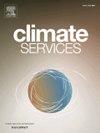弥合差距:性别敏感的气候信息及其对马里豇豆生产的影响
IF 4
3区 环境科学与生态学
Q2 ENVIRONMENTAL SCIENCES
引用次数: 0
摘要
性别动态和气候信息来源的交集显著地影响了马里Cinzana豇豆农民的恢复力和适应能力。本文调查了农民对气候信息的获取和感知,重点关注了增强对气候变率的适应所需的性别差异。该研究还探讨了这两个群体在采取适应气候变化的做法时面临的制约。利用260名豇豆小农(包括133名男性和127名女性)的数据,采用有序logit和多元回归模型。结果表明,年龄、性别、经验年限和高产品种的使用影响农民从各自来源获取信息的频率。研究进一步表明,从电视获取信息、使用高产品种等对豇豆产量有显著影响。我们建议促进促进性别平等的气候信息服务,促进有针对性的干预措施,认识到农民的差异,以加强对资源的公平获取,改善适应,提高马里的豇豆生产力。本文章由计算机程序翻译,如有差异,请以英文原文为准。
Bridging the gap: Gender-sensitive climate information and its implications for cowpea production in Mali
The intersection of gender dynamics and climate information sources significantly shapes the resilience and adaptive capacities of cowpea farmers in Cinzana, Mali. The paper investigates farmers’ access to and perception of climate information, focusing on gender differences that are needed to enhance adaptation to climate variability. The study also explores the constraints faced by both groups in adopting climate-resilient practices. Using data from 260 smallholder cowpea farmers, including 133 men and 127 women, ordered logit and multiple regression models were employed. The results indicate that age, sex, years of experience, and use of high-yielding varieties influence farmers’ frequency of information access from respective sources. The study further revealed that access of information from television, the use of high-yielding varieties, among others, significantly influence cowpea yields. We recommend the promotion of gender-responsive climate information services that facilitate targeted interventions that recognize farmers’ differences to enhance equitable access to resources, improve adaptation, and increase cowpea productivity in Mali.
求助全文
通过发布文献求助,成功后即可免费获取论文全文。
去求助
来源期刊

Climate Services
Multiple-
CiteScore
5.30
自引率
15.60%
发文量
62
期刊介绍:
The journal Climate Services publishes research with a focus on science-based and user-specific climate information underpinning climate services, ultimately to assist society to adapt to climate change. Climate Services brings science and practice closer together. The journal addresses both researchers in the field of climate service research, and stakeholders and practitioners interested in or already applying climate services. It serves as a means of communication, dialogue and exchange between researchers and stakeholders. Climate services pioneers novel research areas that directly refer to how climate information can be applied in methodologies and tools for adaptation to climate change. It publishes best practice examples, case studies as well as theories, methods and data analysis with a clear connection to climate services. The focus of the published work is often multi-disciplinary, case-specific, tailored to specific sectors and strongly application-oriented. To offer a suitable outlet for such studies, Climate Services journal introduced a new section in the research article type. The research article contains a classical scientific part as well as a section with easily understandable practical implications for policy makers and practitioners. The journal''s focus is on the use and usability of climate information for adaptation purposes underpinning climate services.
 求助内容:
求助内容: 应助结果提醒方式:
应助结果提醒方式:


